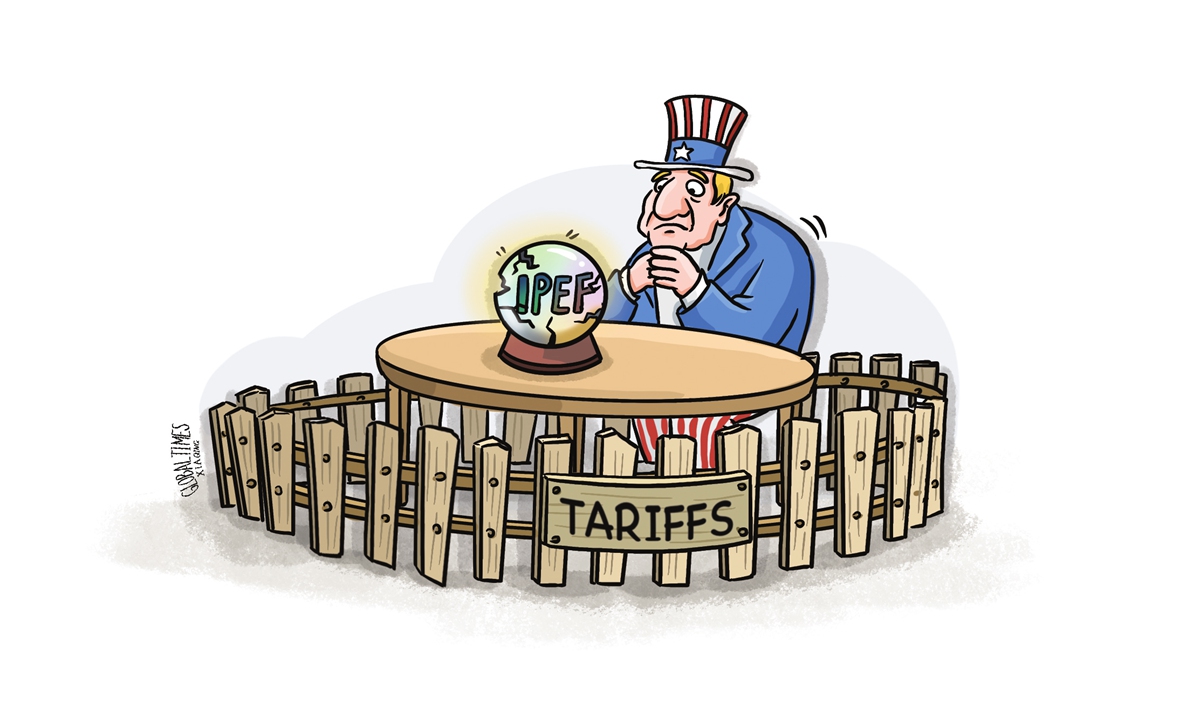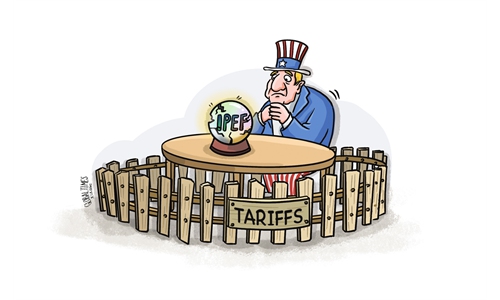US seeks to push forward IPEF, but encounters growing resistance
Talks for 'geopolitical tool' fail to produce concrete progress

Illustration: Xia Qing/Global Times
The US is aggressively pushing forward talks for its so-called Indo-Pacific Economic Framework (IPEF), which is widely viewed as an attempt to rope in countries in the Asia-Pacific region to contain China, but negotiations have not only failed to make any concrete progress but also met with growing criticism and resistance.
The Office of the US Trade Representative (USTR) and the US Commerce Department said in a joint statement on Sunday (US time) that they held the second round of negotiations for the IPEF from March 13 to 19 in Bali, Indonesia.
However, apart from mentions of sharing negotiating texts with "partners," the joint statement did not mention details or any progress made during the talks. There was also much less Western media fanfare over the latest talks, in stark contrast to when US President Joe Biden announced the initiative in Tokyo in May 2022.
"Clearly, the IPEF has made no concrete progress," Gao Lingyun, an expert at the Chinese Academy of Social Sciences in Beijing, told the Global Times on Monday.
"The first problem with the IPEF is that its content is relatively empty with no real substance. It includes 'four pillars,' but it is very confusing for not just us but also regional countries as to what it covers."
According to the White House, the IPEF focuses on four "key pillars" - connected economy (trade), resilient economy (supply chain), clean economy and fair economy (taxes and anti-corruption). However, except for talk of "high-standard commitments," the US government has not released any content of substance.
He Weiwen, a senior fellow at the Center for China and Globalization, pointed out that the IPEF lacks substance and objectives. "It looks like a trade deal, but it apparently does not cover areas usually covered in free trade agreements.
"If it is indeed a free trade agreement (FTA), then how does it differ from many existing FTAs in the region? Will they be in conflict?" He asked.
"So it's only reasonable that progress has been slow, and it has no substance," He told the Global Times.
The USTR and US Commerce Department statement said that "IPEF partners have committed to an aggressive negotiating schedule throughout 2023." The US reportedly aims to strike a deal within 2023.
However, Chinese experts said that given the growing opposition and the lack of substance, even if the US forces countries to sign some version of the IPEF, it won't have as great a negative impact on China as the US intends.
Many countries that the US claims to have signed up for the IPEF also have reservations about the content of the IPEF. India, for example, has opted against joining the IPEF trade pillar negotiations, with Indian officials raising concerns about some issues covered in the IPEF such as digital trade, the environment and labor.
Several high-level US officials have visited India in apparent attempts to persuade the country to join the trade pillar of the IPEF, but to no avail.
Earlier this month, US Commerce Secretary Gina Raimondo visited India and publicly urged New Delhi to join in all four pillars of the IPEF, arguing that the IPEF "will prove to be in many ways more economically impactful than an FTA." India reportedly wants an FTA with the US, but Raimondo made it clear that an FTA was not on the table because the US Congress doesn't have the appetite for one, according to the Press Trust of India.
The deal not only lacks real commitment from the US about greater market access for "partners," but also in effect forces regional countries to join Washington's containment strategy against China, experts noted.
Many in the region have expressed opposition to the US' IPEF.
Former Malaysian prime minister Mahathir Mohamad has criticized the IPEF, saying that "the US will always want to use groupings like this in order to isolate China… many countries recognize that this is not an economic grouping but it is truly a political grouping." The deal won't benefit regional economic growth without China, Mahathir said during a conference in May 2022.
Such criticism is also growing in the region. For example, while the latest IPEF talks were ongoing in Bali on March 15, Indonesian Civil Society Coalition for Economic Justice, a local group, held a protest in front of the US Embassy in Jakarta to express its rejection of the IPEF, according to an online press release.
"In the midst of the global economic crisis, the United States is trying to rebuild its national industrialization with a less open free trade agreement and push for policy harmonization based on US standards," the press release said.



